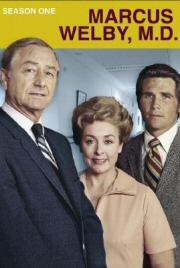Season One
- Drama
- 1969
- Buy the DVD
Reviewed by Will Harris
()
owadays, medical shows are a dime a dozen, but in the late ‘60s…nah, actually, they were relatively prevalent then, too. Something you didn’t see very often, though, were shows which focused on a doctor in private practice. Think about it: both Ben Casey and James Kildare worked in hospitals, and those guys were the poster boys for the genre back in the day. Today, of course, we’ve got that “Grey’s Anatomy” spin-off, but back in the day, there was really only one physician fighting the good fight for the field of private practice medicine: Marcus Welby, M.D., played by Robert Young.
In 1969, Young – best known at the time for the 200-plus episodes that he spent playing the patriarch of the Anderson family on “Father Knows Best” – hadn’t had a regular TV gig in seven years, as his first attempt at a post-“Best” series, “Window on Main Street,” never made it beyond the line-up of CBS’s 1961 – 1962 season. Fortunately, his fatherly demeanor translated easily into a grandfatherly bedside manner, and in ’69, Young’s starring role in a movie-length pilot entitled “A Matter of Humanity” proved successful enough to springboard his character of Dr. Welby into a weekly series.
Since this was the late ‘60s, it should come as no surprise that the generation gap plays a major part in “Marcus Welby, M.D.” In the pilot, Welby, who runs his practice out of his home (or if he doesn’t, then he’s the only doctor I’ve ever seen with an office in the middle of a residential neighborhood), decides to team up with a motorcycle-riding young upstart by the name of Dr. Stephen Kiley, played by James Brolin. As you’d expect, the two of them regularly butt heads on diagnoses, with Kiley perpetually convinced that he’s got a handle on the situation and Welby eventually stepping in to save the day. There’s a slight twist, however, in the fact that ol’ Doc Welby, despite seemingly knowing all there is to know about medicine, is the one with the open mind who’s always ready to consider alternative possibilities. Kiley, meanwhile, tends to play it by the book as often as not, leaving him hesitant to explore things that go against all his fancy med-school learnin’.
Watching “Marcus Welby, M.D.” may leave you stunned at how much has changed in medical science, not to mention society in general, in the years since it originally aired. In one episode, a young pregnant couple almost break up when the husband (played by a pre-“Waltons” Richard Thomas) struggles to accept that his wife had sex with someone before him, a concern which seems to almost outweigh the fact that the sex led to a pregnancy and subsequent abortion; in another episode, we spent an hour on a man whose quality of life is severely affected by the fact that he has anemia, resulting in my wife turning to me with a quizzical expression and asking, “Uh, did anemia used to be a more serious disease?” Hey, treatments change. Just ask anyone who watches the episode that revolves around an autistic boy. We’ve come a long way, baby…
Unlike today’s medical series, there’s precious little in the way of character development when it comes to the doctors. We’re lucky to get so much as a glimpse of the personal lives of Welby and Kiley in Season One, and their nurse/receptionist/girl Friday, Consuelo (Elena Verdugo), is fleshed out even less than they are. Instead, we learn about the patients, with the storylines regularly stepping away to see how the medical conditions and diagnoses affect their lives and families. Fair enough: no one ever really had a problem with not knowing much about Dr. Welby’s life outside of the office, anyway. All they knew was that they liked and trusted the guy, and we do, too, which is why you can still get a lot of enjoyment out of watching this series in 2010.
Special Features: Unless you count the inclusion of the aforementioned pilot movie, “A Matter of Humanity,” then there’s no bonus material to be had. Perhaps it was too much to hope that Brolin would take the time to contribute something, but it still would’ve been nice.
You can follow us on Twitter and Facebook for content updates. Also, sign up for our email list for weekly updates and check us out on Google+ as well.













